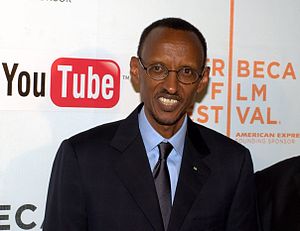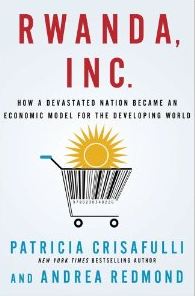 President Paul Kagame of Rwanda at the 2010 Tribeca Film Festival.
(Photo credit: Wikipedia)[/caption]
President Paul Kagame of Rwanda at the 2010 Tribeca Film Festival.
(Photo credit: Wikipedia)[/caption]
By Andrea Redmond & Patricia Crisafulli
Amid the rhetoric, pro and con, around Rwanda, the impartial voice of the marketplace has spoken, with a ringing endorsement of its economic turnaround and prospects for continued growth.
Last week, Rwanda’s debut on the global bond market raised $400 million with an offering that was heavily over-subscribed by nearly eight times. Final yield on the 10-year bonds of 6.875% was less than reported expectations in the low-7% area, due to strong buyer interest. Proceeds will go to repayment of bank loans, infrastructure such as a hydropower project, expansion of the national airline RwandAir, and the completion of a convention center in the capital of Kigali.
The successful bond issue triggered a flurry of enthusiastic postings on Twitter from Rwandan government officials (very savvy users of social media). Finance Minister Claver Gatete hailed a “great day for Rwanda after the investors have shown confidence in our economy….” President Paul Kagame tweeted his congratulations to those who worked to bring the bond offering to a successful conclusion, adding “Let’s continue forward.”
Beyond Rwanda’s enthusiasm, what speaks even more loudly is the oversubscription for these bonds. Yes, there is interest these days in higher yields and geographic diversification. But specific to Rwanda, the success of this offering shows widespread recognition that what has happened to transform this country socially, economically, and politically is real and sustainable.
Rwanda truly is the ultimate turnaround. For the African nation, the comeback has been from the depths of human bankruptcy: genocide in 1994 in which 1 million people were killed in 100 days. Since then, the rebuilding has been impressive, with GDP growth that has risen by 7-8% annually in recent years. In 2012, GDP per capita grew to US$644, up from $593 a year before, according to Rwandan government figures.
Fitch, which affirmed a “B” rating on Rwanda, noted its “solid economic policies and a track record of structural reforms, macroeconomic stability, and low government debt” (23.3% of GDP in Rwanda, compared to the median of 43.5% among B-rated peers). Certainly, the country is not without its challenges; it is landlocked, which vastly increases transportation costs for imported goods, and more electrical generation capacity is needed. It is often clouded by geopolitics, most notably the morass of conflict in the neighboring Democratic Republic of the Congo (DRC). Kagame draws criticism for being too tightly controlling, and human rights watchers charge the country suppresses political opposition and free speech.
 Rwanda, post-genocide, remains a complex place. Having the perpetually turbulent DRC as a next-door neighbor (where some masterminds of the genocide have sought refuge) complicates matters. Yet the country, backed by the strength of its leaders, has clearly put itself on a path of revival and renewal based upon values such as one Rwanda for all Rwandans. It offers universal health care and 12 years of compulsory education for all children, has made significant gains in poverty reduction and food security, and seeks to foster private sector development though homegrown entrepreneurship and foreign direct investment.
Rwanda, post-genocide, remains a complex place. Having the perpetually turbulent DRC as a next-door neighbor (where some masterminds of the genocide have sought refuge) complicates matters. Yet the country, backed by the strength of its leaders, has clearly put itself on a path of revival and renewal based upon values such as one Rwanda for all Rwandans. It offers universal health care and 12 years of compulsory education for all children, has made significant gains in poverty reduction and food security, and seeks to foster private sector development though homegrown entrepreneurship and foreign direct investment.
As we wrote in Rwanda, Inc., the country is no Garden of Eden for business investment. The wheels turn slowly at times with extra bureaucracy—the unintended consequence of strictly enforced zero tolerance for corruption, a policy that is a huge positive for business—and there is need for human capital development, particularly at the middle tier. But Rwanda’s progress continues apace, which the marketplace, the impartial arbiter, recognizes.
Andrea Redmond and Patricia Crisafulli are co-authors of “Rwanda, Inc.: How a Devastated Nation Became an Economic Model for the Developing World” (Palgrave-Macmillan, 2012).
]]>